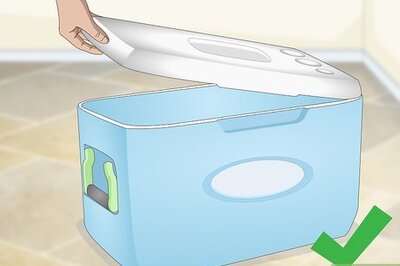
views
Breastmilk contains fats, proteins, carbohydrates, minerals and vitamins which are required by every infant in the early days of life. Other than these, breastmilk also provides the newborn with elements such as oligosaccharides (that act as prebiotics) and hormones such as leptin, adiponectin, IGF-I, ghrelin, obestatin and resistin, which are necessary for the growth and development of the baby.
But many factors can negatively affect the breastmilk, indirectly affecting the baby. In recent research published in The American Journal of Clinical Nutrition, it was found that consumption of sugary beverages by the lactating mother can expose their newborns to added sugars through breastmilk, resulting in various developmental problems.
Apart from that, several other things can affect the colour, volume and frequency of breastmilk:
1. Stress and anxiety
Studies have shown that maternal anxiety and stress can affect the production of breastmilk. Stress and anxiety can increase the levels of adrenaline in the mother’s body, which restrict the natural milk-ejection reflex. It is more common in first-time mothers as they are stressed about breastfeeding and other childcare-related issues.
2. Smoking
Smoking can reduce the volume of the milk as it inhibits the release of prolactin and oxytocin in the body. Prolactin is a hormone required for the growth of breasts and for the production of milk. Various studies conducted on rats have shown that nicotine or tobacco fumes can reduce the release of prolactin and decrease the volume of milk. Nicotine fumes can also hamper the baby’s growth and development.
Oxytocin is required for the ejection of milk, however, smoking stimulates the release of adrenaline, which restricts the release of oxytocin.
3. Caffeinated and alcoholic beverages
While lactating mothers may feel the need to have a cup of coffee early in the morning because of the tiring midnight feeding sessions, it may alter the composition of breastmilk. Studies have shown that caffeine levels can peak about two hours after consuming a caffeinated beverage or food. If your baby consumes the caffeinated milk, it would throw them off their sleeping schedule.
Similarly, consuming alcoholic drinks before feeding a child can harm them adversely, as one unit of alcohol generally takes one to two hours to metabolize and get out of your bloodstream. Studies have also shown that the natural milk-ejection reflex can get hampered by alcohol consumption. Additionally, the effect is dose-dependent, which means the more you consume, the more harm you could do to your child.
4. Some food items
A study conducted in 2008 in Denmark showed that the food consumed by a mother can affect the flavour of the breastmilk. It was found that mint, when consumed, appeared in lower concentrations earlier but was found in higher quantity later, while the taste of banana in breastmilk was found only up to an hour after confusing it. Research has also shown that eating raw garlic can affect the smell of breastmilk. So any such changes in the mother’s diet could result in the infant refusing to feed because of the taste.
5. Certain medicines
There are certain medicines which can dissolve in breastmilk, changing the taste, volume or colour of the milk. These include hypertension medicines, antihistamine (anti-allergy) and decongestant medicines, narcotics and diuretics. Exposure to these medicines at such an early stage of life can be harmful to the baby.
Studies have also shown that oral contraceptives, which contain a combination of estrogen and progestin, can reduce the milk volume and duration of breastfeeding.
For more information, read our article on How to increase breastmilk naturally at home.
Health articles on News18 are written by myUpchar.com, India’s first and biggest resource for verified medical information. At myUpchar, researchers and journalists work with doctors to bring you information on all things health.
Read all the Latest News and Breaking News here

















Comments
0 comment